
|
The 60th Anniversary of VE Day The Way I See It (Reprint) Don Currie, editor First Published March 14, 2005
As the people of the world approach the 60th Anniversary of the Allied Victory in Europe, (V.E. Day), on May 8th 2005, the media is releasing a flood of commentary designed to diminish the legacy and achievement of the anti-Nazi coalition of the Union of Soviet Socialist Republics, the United States of America and Great Britain. Dishonouring the USSR's contribution to the defeat of Hitler Germany and its post-war role in framing the UN Charter is the goal - distortion of history the means. Cold War Historians Canadian historian Margaret MacMillan provost of Trinity College at University of Toronto presents the standard anti-Soviet version of the February 4 -12, 1945 Crimean Conference of Churchill, Roosevelt and Stalin at Yalta preceding the defeat of Nazi Germany on May 8, 1945. Entitling her article, "Yalta's shadow still darkens our lives" (Globe and Mail, February 11, 2005) MacMillan complains bitterly of the Soviet victories on the battlefield that compelled Churchill and Roosevelt to take Stalin's views into account. The audacity of the Soviet Union presuming to have a viewpoint about post-war Europe seems particularly galling to MacMillan. The Road to Yalta
The Steps to the United Nations Stalin, Churchill and Roosevelt put forward their respective basic proposals at Yalta in the period when Hitler was in the grip of a two front war. The end was near. Churchill met with Stalin grudgingly and with ill-disguised malice frustrated at the decline of British empire to an "also ran" behind the USA. The poodle status of Britain remains to this day.
Preceding the San Francisco meeting the USA cobbled together a Conference in Mexico City of its client Latin American states which had played no role in the defeat of Hitler to ensure the USA had an obedient majority at the San Francisco meeting. It used its majority to exclude as participants Poland, Albania, the Mongolian People's Republic, all with records of struggle against Hitler. Soviet Byelorussia and Ukraine were invited as founding members. On the insistence of the Soviet Union Poland was nonetheless reserved a seat as a founding member. Following inclusion of representatives of the Polish émigré London group into the Polish cabinet, the United States and Britain recognized Poland in June 1945 and it took its place at the UN in due course. The US role at the San Francisco Conference was to attempt to shape the United Nations into a creature of US post-war expansionist goals It failed. The organization was founded on the principles of the sovereignty of nations, the equality of all member states and the principal of Great Power unanimity embodied in the Security Council and the fundamental principals of the UN Charter. The San Francisco Conference passed on its decisions to a meeting of experts including representatives from Canada, that met at Dumbarton Oaks, Washington DC Sept 21 - Oct 7 1944 to finalize the actual wording of the United Nations Charter. Their work, a joint effort of the Allied nations, produced the documents which to this day remain the best hope of humankind for peace. Margaret MacMillan sees nothing but post-war defeat having emerged from Yalta when the whole world saw it as its best hope for peace. Yalta took place in the context of the real balance of military power in Europe resulting from the breathtaking Soviet advances on the battlefield. The positions of the leaders of the anti-Nazi wartime alliance by that time were well stated. There were no surprises. MacMillan's attempt to depict Churchill and Roosevelt as inept and manipulated by Stalin is disingenuous and demeans the great sweep of historical events into a snide and sordid little drama of interest only to MacMillan. If Professor MacMillan doesn't approve of what transpired after Yalta she should blame Hitler and those who urged him to go to war, not  Stalin, of whom Marshall Georgy Zhukov Chief of the Soviet Army's General Staff observed in his memoirs, that "without his stern exactingness we could not have won." Potsdam and Nuclear Blackmail The Yalta Conference discussed and laid out the European frontiers as they were in the main confirmed at the Potsdam Conference on July 15, 1945. Potsdam set the frontiers of Poland that restored her lost western frontiers. It also settled the matter of the de-nazification of Germany, the dismantling of its war industries and the form of its post-war unity. The US proposal to divide Germany into three separate states was rejected. The Conference ordered the arrest and judgement of Nazi war criminals at Nuremburg.
The demonstration of the use of nuclear power as a military weapon was not long in coming. On August 6, 1945 the US dropped the atomic bomb on Hiroshima and on August 9 on Nagasaki. The era of US nuclear blackmail had begun. It signalled the decision of the USA to break up the Allied anti-Hitler Alliance and to pick up the banner from Hitler of isolating and destroying the Soviet Union and embark on a uniquely US  path towards world domination which to this day it pursues with renewed and grandiose fanaticism.   Who Paved Hitler's Path to War? The lessons of the Second World War are bitter and exacting. The war did not allow for silence or neutrality then and less so today. Six decades later, it is a measure of how the cold war corrupted collective memory that it has become necessary to remind the present generation and notables such as MacMillian that the Soviet Union did not cause World War Two and did everything in its power to prevent its outbreak. Nazi Germany, German financiers and their western corporate accomplices caused World War Two and are solely responsible for its terrible human cost. That is why the peace movement today exposes the corporate connections between the Bush administration, vice-President Dick Cheney and their mad dream of US hegemony in today's world. War is rarely justified. It is never justified because it makes money for a few corporate insiders. Nazi Expectations of Victory
British Prime Minister Chamberlain had abandoned Czechoslovakia, Austria, and Poland to their fate. Britain fled Europe in April 1940 following the "Phoney War". Hitler overwhelmed Norway, Denmark, the Netherlands, Belgium, Luxembourg, France and the Balkan states and assured by Britain and the USA they would not interfere, attacked the USSR with the full power of the German armed forces. The Nazis and their supporters expected to win because they considered the Soviet people and their socialist system another easy victim, racially inferior, lacking resources and the will to resist. Placing all of his confidence in massive German superiority in modern weapons and Blitzkrieg, Hitler expected to defeat the Soviet Union in six weeks, depopulate its territory, raze its cities and steal its vast natural resources to support German capitalism's drive for world domination. The Soviet Union Fights Back. The CPSU Inspires the Struggle.
Sanitizing Hitler Germany
Before World War Two was over cold war academics were set the task of
constructing a post-war politically sanitized version of the defeat of Hitler
Germany devoid of its anti-nazi essence. Their version of WW2 redefined Nazism,
not as an openly terroristic form of capitalism but as an inexplicable "evil"
run amok. Attributing 50 million deaths and the devastation of Europe and much
of Asia to a bizarre Nazi madness is a deliberate attempt to exonerate fascism
on the grounds that it was a logical but misguided response to a This canard was the central defence of the Nazis at the Nuremberg Trials and remains to this day, in a thinly disguised form, the justification of all apologists of Hitler. Anti-communism and anti-Sovietism is in fact the only excuse advanced by nazi apologists, collaborators and appeasers to justify Hitler's crimes. Those who postulate such an interpretation of the Second World War promote the redemption of Hitler from an international German imperialist criminal to a misunderstood anti-Communist defender of "western civilization and values." All anti-Communist anti-Soviet interpretations of history tap-dance endlessly around this historical dead end. The Soviet Union's Decisive Role
Not until the Red Army hurled back the Hitlerites from the outskirts of Moscow 1941-42, broke the Nazi armies at Stalingrad 1942-43, lifted the blockade of Leningrad 1943, defeated Hitler's Panzers at Kursk 1943, liberated Byelorussia , Ukraine and the Caucuses 1943, liberated Hungary, Rumania and Bulgaria 1944 and moved the whole front  westward from the Dneiper to the Vistula , and stood poised to advance to the Oder and take Berlin, did Churchill and Roosevelt heed the rising world-wide demand for a Second Front. The Second Front Delayed An oft-quoted comment by Harry S. Truman, future President of the United States sums up succinctly why the Second Front was delayed until June 1944. Truman said,  "If we see that Germany is winning we ought to help Russia and if Russia is winning we ought to help Germany and that way let them kill as many as possible", (New York Times June 24, 1941). Truman's imperious, amoral disregard for German and Russian life helps one to understand better why he was the one who ordered the dropping of the atomic bombs on Hiroshima and Nagasaki in August 1945.
The Human Cost of War Total military and civilian casualties of the Second World War were in the range of 50 million. Estimates vary depending on sources but there is general agreement that one half of the overall number was Soviet citizens. Accurate numbers of Soviet combatants killed are in dispute but estimates exceed ten million.  British casualties were 271,311 military and 60,595 civilian. French losses 173,260 military, 210, 671 civilian. US military dead numbered 292,100. Canada lost 39,319. (Atlas of World War Two - David Jordan and Andrew Wiest, Silverdale Books 2004 page 251) The sacrifice of British, American, and Canadian, forces who participated in the Normandy landings on June 6th. 1944 and participated in any theatre of the war against Hitler is heroic and honourable. No western military historian would tolerate the diminishment of a single individual killed resisting Hitler because their country of origin was capitalist. Nor do Communists tolerate the diminishment of the Soviet Union's sacrifice because some western historians disapprove of socialism. The Military Balance of Power on the Eastern and Western Fronts
The Material Cost of War
The Pre-Conditions for People's Democracies Is it therefore so difficult to understand, why, millions of Europeans who shared with the Soviet people the loss of everything they considered human and worthwhile in life at the hands of the Nazis, looked upon the Red Army and the Soviet Union as a liberator and it's socialist system a viable post-war alternative to the pre-war capitalist regimes that had failed so utterly and miserably to resist Nazi power? 
We remind those who may not know that the U.S. corporation, IBM, supplied the Nazis with punch card systems to keep track of their concentration camp victims. Number 6 on the card signified Communist, number 8 signified Jew.  (From the Documentary "Corporation") Nazis Resurrected No Communist will deny that the presence of Soviet forces in East European states at the end of the war prevented Nazis and collaborators from playing any role in the establishment of People's Democracies that later became Socialist states. The Soviets insisted on anti-Nazi credentials. The mandate to exclude Nazis from forming post-war governments was part of the Yalta Agreements. The Soviets carried out these agreements to the letter.
Communists Excluded While permitting the integration of Nazis into the post-war revival of West Germany, their victims, the Communists were being excluded from its political life. Hitler banned the German Communist Party in 1933 and murdered hundreds of thousands of its members including heroic anti-fascist leader, Ernst Thaelmann kept in Nazi jails for 11 years subjected to torture and brought to Buchenwald on August 17th 1944 where he was put to death. Under Conrad Adenhuer's watch the German Communist Party was again banned. The French and Italian Communist Parties which had led the resistance and emerged from the war leading mass parties were systematically excluded from participating in post-war governments. Tim Buck Speaks to Canadians - The Post-War Alternatives.
Buck was reflecting accurately the support of the Canadian people for the opening of the Second Front and for total Allied war on Hitler Germany. Canadians at that time recognized that the Soviet Union had for three long years, carried the main burden of the war against Hitler and had made the greatest military contributions to his defeat. More remarkable was that fact that this recognition extended into the ranks of the ruling elite and to the highest levels of the governing Liberal Government. Message to Stalin
US Imperialism Turns Its Back on Post-War Cooperation
The assessment of Tim Buck a Communist and General A.G.L. McNaughton a Liberal,
expressed the political breadth of the expectations of millions of Canadians in
1944 and their high hopes for total victory and a post-war world of co-operation
and peace. It wasn't to be. Instead of President Truman offering to assist the
Soviet Union and the East European states ravaged by war, he offered them
nuclear black mail and the cold war. The United States emerged from the war
unscathed and bloated with capital from the expansion of its wartime industries.
It had suffered less than 3% of the casualties suffered by the USSR.
The Soviet Union from that point onward, at the earliest stage of its post-war recovery was dragged into a new and more costly arms race that impeded the pace of its recovery and in particular slowed its efforts to satisfy the rising consumer needs of its people. The USA spurned the Soviet Union's policy of peaceful coexistence and instead organized a new NATO alliance and worked without respite to surround Soviet territory with nuclear missiles from London to Turkey, from West Germany to the Mediterranean. The Truth is Bitter the Lessons Harsh Marxist historians are at the beginning of the study of the factors leading to the undermining of the Soviet Union. So far studies have concentrated on weaknesses in the internal development of its economy and in particular the rise of a parallel black market economy and the failures of the Communist Party including shortcomings in its post-war national policy and other factors.
Nor is it enough to generalize and say the obvious that war and preparations for war is the normal state of affairs for imperialism. Not all imperialist states today are yet willing to re-visit the horrors of the Second World War or tear up the post war agreements on nuclear disarmament and the UN Charter. Some have opted for non-belligerent stances in international affairs. So far Canada is one of those states. It is our duty to fight to keep it that way. Unlike the rulers of the USA, revelling in imperialist conceit, believing they owe nothing to the Soviet Union, many countries including our own, retain a semblance of collective memory that includes gratitude for the sacrifice of the millions Red Army soldiers, their commanders and their Government for defeating Hitler Germany. We have not forgotten. The Last Days Marshal Vasili I. Chuikov, Former Supreme Commander of Soviet Land Forces, Commander of the 8th. Guards Soviet Army that fought the Hitlerites from the liberation of Stalingrad to the fall of Berlin actually received the first offer of capitulation from Nazi General Krebs in Berlin on May 1st. 1945. While Krebs approached the Soviet Army, Herman Goering approached the Americans and Heinrich Himmler petitioned the British seeking to divide the Allies at the very end of the war. They failed.
By 4 May 1945 almost all German resistance had ceased. At British Field Marshall Montgomery's headquarters on Luneburg Heath, the Germans surrendered all their forces in the Netherlands, Denmark and North Germany; the next day emissaries arrived at US General Dwight Eisenhower's headquarters and signed the armistice on 7 May at 02:40 hours. The war in Europe ended the next day. The formal act of German unconditional surrender took place May 8th at Karlshorst. Marshall G.K. Zhukov, represented the Soviet Supreme Command, Air Chief Marshall A.W. Tedder represented the British Supreme Command, General Carl Spaatz represented the United States Armed Forces and General Jean de Lattre de Tassigny, Commander-in-Chief represented the French Army. In their presence German Fieldmarshall Keitel, Admiral Friedeburg and Air Colonel -General Stumpf signed the act of unconditional surrender. |

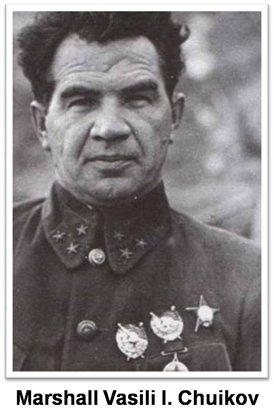 "He who thinks about the past
has the future in mind also. He who speaks of the future has no right to
forget the past. I who have passed through the fire of many battles - I am
against war."
"He who thinks about the past
has the future in mind also. He who speaks of the future has no right to
forget the past. I who have passed through the fire of many battles - I am
against war."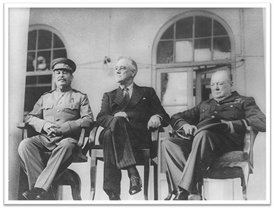 Being a historian of note, MacMillan could
have written a less subjective account. She could have explained that Yalta was
a critical but by no means the only Allied war-time meeting. The USA and Britain
first met their Soviet counterparts in Moscow Sept-Oct, 1941 to consider western
aid to the Soviet Union's war effort. They met again at the Moscow Foreign
Minister's Conference Oct 19-30, 1943 to consider steps to speed the end of the
war and to prepare the agenda of the Nov 28 to Dec 1, 1943 Tehran Meeting of
Stalin, Roosevelt and Churchill. On the way to Teheran Churchill and Roosevelt
met Chiang Kai-shek in Cairo on Nov 22-26 to agree on plans for defeating Japan
including guarantees of Korea's unity and to gain the agreement of the Soviet
Union to enter the war against Japan as soon as Hitler was defeated. Teheran
resulted in the historic decision to open the Second Front before May 1, 1944
(it actually opened June 6, 1944). Teheran began the debate on the shape of the
post-war world and form and substance of the United Nations.
Being a historian of note, MacMillan could
have written a less subjective account. She could have explained that Yalta was
a critical but by no means the only Allied war-time meeting. The USA and Britain
first met their Soviet counterparts in Moscow Sept-Oct, 1941 to consider western
aid to the Soviet Union's war effort. They met again at the Moscow Foreign
Minister's Conference Oct 19-30, 1943 to consider steps to speed the end of the
war and to prepare the agenda of the Nov 28 to Dec 1, 1943 Tehran Meeting of
Stalin, Roosevelt and Churchill. On the way to Teheran Churchill and Roosevelt
met Chiang Kai-shek in Cairo on Nov 22-26 to agree on plans for defeating Japan
including guarantees of Korea's unity and to gain the agreement of the Soviet
Union to enter the war against Japan as soon as Hitler was defeated. Teheran
resulted in the historic decision to open the Second Front before May 1, 1944
(it actually opened June 6, 1944). Teheran began the debate on the shape of the
post-war world and form and substance of the United Nations. 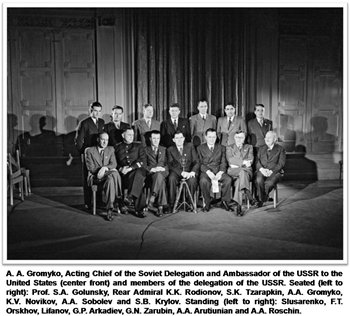 Yalta was followed by the San Francisco
Conference of April 25, 1945 attended by 46 countries to refine the Yalta
proposals into the fundamentals of the United Nations. Hundreds of delegates,
supported by 1200 advisors and in the full glare of the world's media debated
the raw politics of post-war Europe and the world in the context of the
formation of the United Nations.
Yalta was followed by the San Francisco
Conference of April 25, 1945 attended by 46 countries to refine the Yalta
proposals into the fundamentals of the United Nations. Hundreds of delegates,
supported by 1200 advisors and in the full glare of the world's media debated
the raw politics of post-war Europe and the world in the context of the
formation of the United Nations. 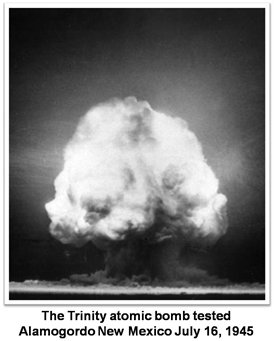 On the very day the Potsdam Conference
opened the USA tested the atomic bomb at Alamogordo New Mexico. President Truman
wrote in his memoirs that his advisors, State Secretary Byrnes and Secretary of
War Stimson were of opinion that,".. the bomb might well put us in a position to
dictate our own terms at the end of the war."
On the very day the Potsdam Conference
opened the USA tested the atomic bomb at Alamogordo New Mexico. President Truman
wrote in his memoirs that his advisors, State Secretary Byrnes and Secretary of
War Stimson were of opinion that,".. the bomb might well put us in a position to
dictate our own terms at the end of the war."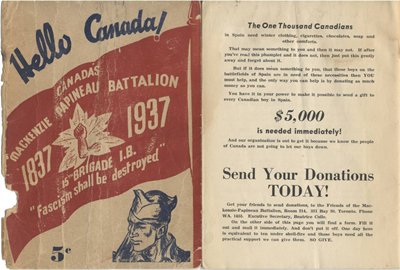 Hitler Germany and its coalition partners
didn't expect to lose the war when it invaded the Soviet Union on June 22, 1941.
Hitler intervened in the Spanish Civil War in 1936-1939 while the USA, Britain,
France and Canada stood aside in neutrality. Hitler's Condor Divisions, using
superior Panzers and massive bombing of civilians suppressed the democratically
elected anti-fascist Spanish Government, a coalition of Republicans and
Communists and installed the fascist Franco as dictator. Anti-fascist volunteers
from all over the world, among them the MacKenize Papineau Battalion from Canada
went to Spain to support Spanish democracy. The Mac Paps were the first
Canadians to fight Hitler. 1448 volunteered and 721 were killed. A memorial to
their sacrifice was unveiled at Ottawa in 2001 by Governor General Adrian
Clarkson.
Hitler Germany and its coalition partners
didn't expect to lose the war when it invaded the Soviet Union on June 22, 1941.
Hitler intervened in the Spanish Civil War in 1936-1939 while the USA, Britain,
France and Canada stood aside in neutrality. Hitler's Condor Divisions, using
superior Panzers and massive bombing of civilians suppressed the democratically
elected anti-fascist Spanish Government, a coalition of Republicans and
Communists and installed the fascist Franco as dictator. Anti-fascist volunteers
from all over the world, among them the MacKenize Papineau Battalion from Canada
went to Spain to support Spanish democracy. The Mac Paps were the first
Canadians to fight Hitler. 1448 volunteered and 721 were killed. A memorial to
their sacrifice was unveiled at Ottawa in 2001 by Governor General Adrian
Clarkson.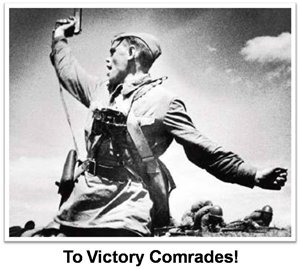 When attacked the Soviet Union did the unthinkable, it
fought back. The Soviet people astounded the world by absorbing the full
onslaught of the German Armed Forces and in a series of massive counter-blows
expelled the invader and in the process liberated most of Europe from Nazi
slavery. Soviet military historians attribute the socialist system and the
leadership of the Communist Party of the Soviet Union (CPSU) as the main factors
in mobilizing the people to repulse the invader. Western historians devote all
of their efforts to refute that assertion. They spare no effort to prevent
public discourse from straying from the  cold-war stereotype of Communism and
Soviet Socialism, lest the youth of today, who in growing numbers actively
oppose the US war in Iraq and are beginning to associate war in general with
capitalism may begin to associate peace in general with socialism.
When attacked the Soviet Union did the unthinkable, it
fought back. The Soviet people astounded the world by absorbing the full
onslaught of the German Armed Forces and in a series of massive counter-blows
expelled the invader and in the process liberated most of Europe from Nazi
slavery. Soviet military historians attribute the socialist system and the
leadership of the Communist Party of the Soviet Union (CPSU) as the main factors
in mobilizing the people to repulse the invader. Western historians devote all
of their efforts to refute that assertion. They spare no effort to prevent
public discourse from straying from the  cold-war stereotype of Communism and
Soviet Socialism, lest the youth of today, who in growing numbers actively
oppose the US war in Iraq and are beginning to associate war in general with
capitalism may begin to associate peace in general with socialism.
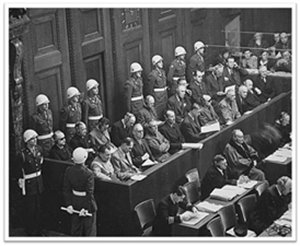 greater evil Communism. Nazi collaborators and appeasers to this day
use this brazen lie to defend their acts of betrayal before, during and after
the war. How could any system, they argue, however despotic be totally bad if it
had as its stated aim the destruction of "Soviet Bolshevism."
greater evil Communism. Nazi collaborators and appeasers to this day
use this brazen lie to defend their acts of betrayal before, during and after
the war. How could any system, they argue, however despotic be totally bad if it
had as its stated aim the destruction of "Soviet Bolshevism." 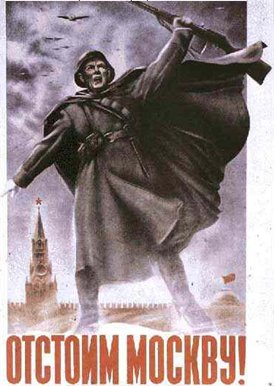 The history of the Second World War is no
history at all without dealing objectively with the decisive role of the Soviet
Union in ridding Europe of a Nazi-coalition of the willing, comprising
Mussolini’s Italy, Mannerheim's Finland, Ionescu's Rumania, Horthy's Hungary,
pro-fascist Bulgaria, and the host of Quislings, pro-nazi collaborators and
appeasers in all countries who aided and abetted the rise of Hitler.
The history of the Second World War is no
history at all without dealing objectively with the decisive role of the Soviet
Union in ridding Europe of a Nazi-coalition of the willing, comprising
Mussolini’s Italy, Mannerheim's Finland, Ionescu's Rumania, Horthy's Hungary,
pro-fascist Bulgaria, and the host of Quislings, pro-nazi collaborators and
appeasers in all countries who aided and abetted the rise of Hitler.
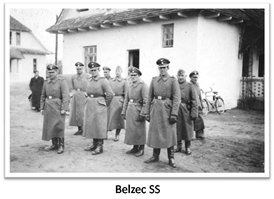 And what of the fate of millions in Nazi occupied Europe as the Second Front was
delayed?  It was in the period 1941-44 that Hitler's SS put to death 12 million
people in Nazi extermination camps, including 8 million European Jews. During
the period 1941 to 44 millions of Europeans were enslaved and worked to death in
German factories, sent there from all occupied countries by Nazi invaders. The
people of Poland were killed in the millions by Nazi occupiers. Hundreds of
thousands of German, Czech, Polish, Norwegian, Danish, Dutch, French, Greek,
Italian, Yugoslav, Bulgarian patriots and partisans and underground fighters in
all Nazi occupied countries and territories gave their lives resisting Nazi
tyranny while calling in vain upon Britain and the USA to open a Second Front.
And what of the fate of millions in Nazi occupied Europe as the Second Front was
delayed?  It was in the period 1941-44 that Hitler's SS put to death 12 million
people in Nazi extermination camps, including 8 million European Jews. During
the period 1941 to 44 millions of Europeans were enslaved and worked to death in
German factories, sent there from all occupied countries by Nazi invaders. The
people of Poland were killed in the millions by Nazi occupiers. Hundreds of
thousands of German, Czech, Polish, Norwegian, Danish, Dutch, French, Greek,
Italian, Yugoslav, Bulgarian patriots and partisans and underground fighters in
all Nazi occupied countries and territories gave their lives resisting Nazi
tyranny while calling in vain upon Britain and the USA to open a Second Front.
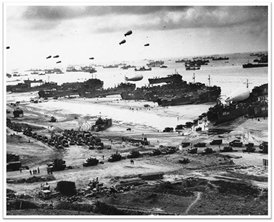 When Hitler Germany attacked the Soviet
Union on June 22nd 1941 German military planners committed 153 divisions out of
a total of 217, 70.3% to the Eastern Front and committed 0.9% to other fronts.
The proportions grew each year until by January 1944 Hitler commanded 317
divisions of which 201 or 63.4% were committed to the Eastern Front and 6.6%
committed to other fronts. The British, Canadian and American landings at
Normandy of June 6th 1944 that opened the Second Front changed matters. At that
juncture, out of a total of 313.5 German divisions 179 or 56% were deployed to
the Eastern Front and 118 including 12 divisions operating against the People's
Liberation Army of Yugoslavia or 37.6% were committed to the other fronts
principally the western front. German divisions not committed to various fronts
were deployed to occupied territory and inside Germany.
When Hitler Germany attacked the Soviet
Union on June 22nd 1941 German military planners committed 153 divisions out of
a total of 217, 70.3% to the Eastern Front and committed 0.9% to other fronts.
The proportions grew each year until by January 1944 Hitler commanded 317
divisions of which 201 or 63.4% were committed to the Eastern Front and 6.6%
committed to other fronts. The British, Canadian and American landings at
Normandy of June 6th 1944 that opened the Second Front changed matters. At that
juncture, out of a total of 313.5 German divisions 179 or 56% were deployed to
the Eastern Front and 118 including 12 divisions operating against the People's
Liberation Army of Yugoslavia or 37.6% were committed to the other fronts
principally the western front. German divisions not committed to various fronts
were deployed to occupied territory and inside Germany.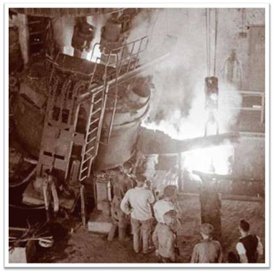 In addition to sustaining the greatest human
losses the Soviet Union experienced the greatest material and economic losses of
any Allied nation. Nazi occupation of Soviet territory from 1941 to 1944 was not
benign. Cities, towns and villages were destroyed. Natural resources in occupied
territory were sent west by the Nazis to sustain German industry. Electrical
generating capacity was destroyed. Mines were flooded. Factories were plundered
and destroyed. Collective farms were destroyed and the food and livestock
production was stolen and shipped west. When the Soviet Union retreated from the
Polish border to the line from Leningrad, Moscow to the Caucuses it lost more
than 40% of its total productive capacity to wage war. Had it not anticipated
the war and in one of the most remarkable feats of mass labour heroism,
transferred its vital war industries to its far-eastern territories the outcome
may have been different. Soviet historians record that in the second half of
1941, more than 1,360 large, chiefly war, enterprises and over 10 million people
were evacuated to the east and the entire economy put on a war production
footing.
In addition to sustaining the greatest human
losses the Soviet Union experienced the greatest material and economic losses of
any Allied nation. Nazi occupation of Soviet territory from 1941 to 1944 was not
benign. Cities, towns and villages were destroyed. Natural resources in occupied
territory were sent west by the Nazis to sustain German industry. Electrical
generating capacity was destroyed. Mines were flooded. Factories were plundered
and destroyed. Collective farms were destroyed and the food and livestock
production was stolen and shipped west. When the Soviet Union retreated from the
Polish border to the line from Leningrad, Moscow to the Caucuses it lost more
than 40% of its total productive capacity to wage war. Had it not anticipated
the war and in one of the most remarkable feats of mass labour heroism,
transferred its vital war industries to its far-eastern territories the outcome
may have been different. Soviet historians record that in the second half of
1941, more than 1,360 large, chiefly war, enterprises and over 10 million people
were evacuated to the east and the entire economy put on a war production
footing. 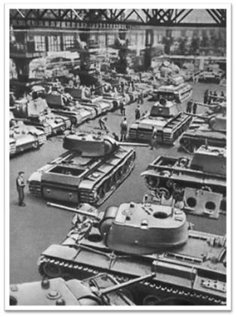 Taking 1940 as 100, Soviet
productive capacity by 1944 for national income was 88, total industrial output
104, including a rise in armament production to 251. Agriculture was 54,
transportation 71, retail trade 37 and state budget revenues 149. At the end of
the war the Soviet economy began the transition to peacetime production. It
began this process from a point where its domestic production of consumer goods,
especially food, was one-half of its 1940 level. The Soviet government began to
shift its economy from a war-time footing to peace- time with its social
infrastructure, housing, hospitals, schools, cultural institutions under acute
pressure to meet the needs of the people. Collective and state farms, roads,
bridges, rail and air transport, were all in need of rapid restoration and
modernizing. The task was made more complex by the need first to restore the
heavy productive capacity of the liberated republics. Mines, steel mills, hydro
and thermal electrical capacity and chemical industries had to be rebuilt.
Transportation had to be restored and extended. Whole cities such as Minsk and
Kiev had to be completely rebuilt. The task was daunting. Millions of Soviet
citizens were displaced and millions of demobilized soldiers especially the
wounded and those bereft of families killed by the Nazis had to be reintegrated
and employed in post war society.
Taking 1940 as 100, Soviet
productive capacity by 1944 for national income was 88, total industrial output
104, including a rise in armament production to 251. Agriculture was 54,
transportation 71, retail trade 37 and state budget revenues 149. At the end of
the war the Soviet economy began the transition to peacetime production. It
began this process from a point where its domestic production of consumer goods,
especially food, was one-half of its 1940 level. The Soviet government began to
shift its economy from a war-time footing to peace- time with its social
infrastructure, housing, hospitals, schools, cultural institutions under acute
pressure to meet the needs of the people. Collective and state farms, roads,
bridges, rail and air transport, were all in need of rapid restoration and
modernizing. The task was made more complex by the need first to restore the
heavy productive capacity of the liberated republics. Mines, steel mills, hydro
and thermal electrical capacity and chemical industries had to be rebuilt.
Transportation had to be restored and extended. Whole cities such as Minsk and
Kiev had to be completely rebuilt. The task was daunting. Millions of Soviet
citizens were displaced and millions of demobilized soldiers especially the
wounded and those bereft of families killed by the Nazis had to be reintegrated
and employed in post war society. 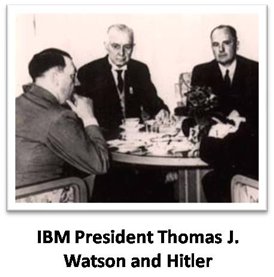 Anti-Communist historians never tire of asserting that
there was no compelling logic, nor popular support for the establishment of
People's Democracies in post-war Europe. They seek to cover up the bonds of
anti-fascist solidarity that had developed during the war among the common
working people of Europe and the Soviet Union. They seek to sully, trivialize
and diminish the sacrifices and leadership of the Communist Parties of Europe
within the anti-fascist, patriotic struggles against Nazi tyranny that
rightfully accorded to them a leading role in ensuring an anti-fascist political
make up of post-war governments.
Anti-Communist historians never tire of asserting that
there was no compelling logic, nor popular support for the establishment of
People's Democracies in post-war Europe. They seek to cover up the bonds of
anti-fascist solidarity that had developed during the war among the common
working people of Europe and the Soviet Union. They seek to sully, trivialize
and diminish the sacrifices and leadership of the Communist Parties of Europe
within the anti-fascist, patriotic struggles against Nazi tyranny that
rightfully accorded to them a leading role in ensuring an anti-fascist political
make up of post-war governments. 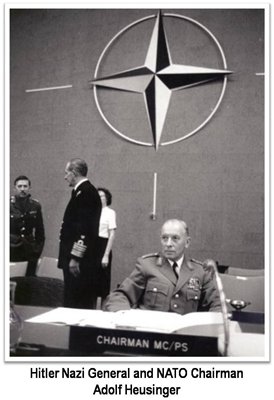 Historians playing fast and loose with the
facts should be required to explain why the Americans did not exclude Nazis from
the formation of post-war West Germany and promoted the likes of Conrad Adenhuer,
and Ludwig Erhard, both war-time Nazi supporters to the rank of Chancellor in
post-war West Germany. Another notable was Franz-Joseph Strauss, one of Hitler's
army propaganda officers in the early 1940's who rose to become the leader of
Bavaria and who called insistently for revenge against the Soviet Union. We may
also ask why the USA said nothing about the promotion of the likes of Hitler
General and war-criminal Foertsch as supreme commander of the West German armed
forces and accepted Nazi-general Adolf Heusinger as the head of NATO staff in
Washington.
Historians playing fast and loose with the
facts should be required to explain why the Americans did not exclude Nazis from
the formation of post-war West Germany and promoted the likes of Conrad Adenhuer,
and Ludwig Erhard, both war-time Nazi supporters to the rank of Chancellor in
post-war West Germany. Another notable was Franz-Joseph Strauss, one of Hitler's
army propaganda officers in the early 1940's who rose to become the leader of
Bavaria and who called insistently for revenge against the Soviet Union. We may
also ask why the USA said nothing about the promotion of the likes of Hitler
General and war-criminal Foertsch as supreme commander of the West German armed
forces and accepted Nazi-general Adolf Heusinger as the head of NATO staff in
Washington. 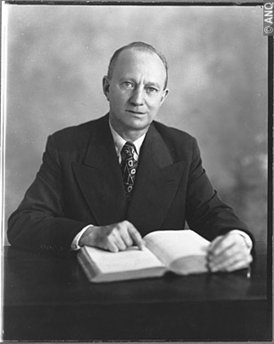 During April 1944 two months before the June 6 landings
of American, British and Canadian forces in Normandy that opened the second
front and a scant year before VE Day on May 8th. 1945, Tim Buck, Leader of the
Labour Progressive Party (Communist) addressed the following statement to the
Canadian working class and labour movement in the first issue of the Party's new
journal Labour Affairs Monthly:
During April 1944 two months before the June 6 landings
of American, British and Canadian forces in Normandy that opened the second
front and a scant year before VE Day on May 8th. 1945, Tim Buck, Leader of the
Labour Progressive Party (Communist) addressed the following statement to the
Canadian working class and labour movement in the first issue of the Party's new
journal Labour Affairs Monthly: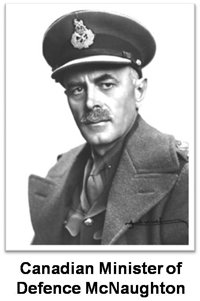 General A.G.L. McNaughton, Canada's Minister
of National Defence sent a message to Marshall Joseph Stalin in May 1944 and
said; "This day the peoples of the Union of Soviet Socialist Republics celebrate
a momentous anniversary. On behalf of the Canadian army I am pleased to extend
to their comrades in arms congratulations on their superb successes in great
battles and good wishes for continued victorious progress:
General A.G.L. McNaughton, Canada's Minister
of National Defence sent a message to Marshall Joseph Stalin in May 1944 and
said; "This day the peoples of the Union of Soviet Socialist Republics celebrate
a momentous anniversary. On behalf of the Canadian army I am pleased to extend
to their comrades in arms congratulations on their superb successes in great
battles and good wishes for continued victorious progress: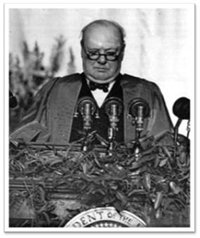 It devoted
all of its enormous economic wealth to the Marshall Plan to rebuild and re-arm
West Germany under the command of unrepentant revanchists. If the USSR
maintained 7million troops in Europe in the immediate aftermath of the war it
was because it had every reason to believe that the USA was preparing to use its
nuclear advantage to launch a new war to finally destroy the land of socialism. This fear was reinforced when Churchill delivered his cold-war "Iron Curtain"
Fulton Missouri speech in 1946 picking up the anti-Soviet propaganda line where
Joseph Goebbel's had left it in Hitler's bunker.
It devoted
all of its enormous economic wealth to the Marshall Plan to rebuild and re-arm
West Germany under the command of unrepentant revanchists. If the USSR
maintained 7million troops in Europe in the immediate aftermath of the war it
was because it had every reason to believe that the USA was preparing to use its
nuclear advantage to launch a new war to finally destroy the land of socialism. This fear was reinforced when Churchill delivered his cold-war "Iron Curtain"
Fulton Missouri speech in 1946 picking up the anti-Soviet propaganda line where
Joseph Goebbel's had left it in Hitler's bunker.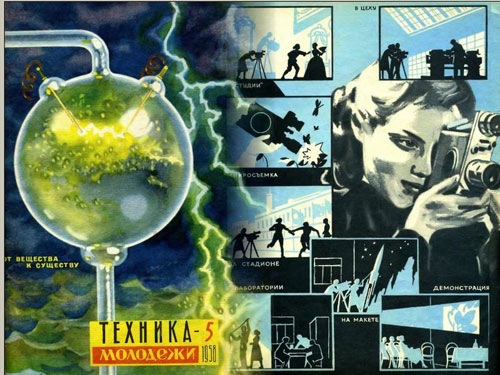 This observer is no historian. However until convinced otherwise, I believe all
of the factors mentioned are derivative of the main factor, the betrayal of the
USA of its post-war obligations as outlined in the meetings and conferences that
resulted from the defeat of Hitler Germany. The US corporations and the state
that serves its interest, betrayed the people, including its own, and elevated
its global ambitions above any and all considerations of the needs of humankind
for peace and now even the survival of the biosphere. The violent and subversive
intent of the ruling circles of the USA towards any social or economic
development independent of US direction and control is the primary cause of the
set backs for human progress including the great socialist experiment in the
USSR. Any other conclusion winds up in the swamp of cold-war anti-Communism.
This observer is no historian. However until convinced otherwise, I believe all
of the factors mentioned are derivative of the main factor, the betrayal of the
USA of its post-war obligations as outlined in the meetings and conferences that
resulted from the defeat of Hitler Germany. The US corporations and the state
that serves its interest, betrayed the people, including its own, and elevated
its global ambitions above any and all considerations of the needs of humankind
for peace and now even the survival of the biosphere. The violent and subversive
intent of the ruling circles of the USA towards any social or economic
development independent of US direction and control is the primary cause of the
set backs for human progress including the great socialist experiment in the
USSR. Any other conclusion winds up in the swamp of cold-war anti-Communism.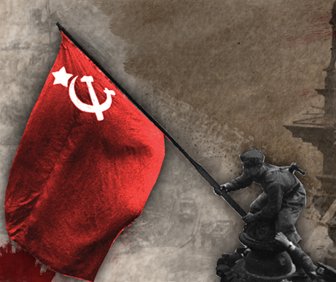 Resistance in Berlin collapsed on 28 April. On 30 April Soviet units assaulted
and captured the Reichstag building. Soviet soldiers M.A. Yegorov and M.V.
Kantaria hoisted the Soviet flag. At 15:30 hours Hitler killed himself  and
Joseph Goebbells followed the next day. The Berlin garrison surrendered to
Soviet forces on 2 May 1945.
Resistance in Berlin collapsed on 28 April. On 30 April Soviet units assaulted
and captured the Reichstag building. Soviet soldiers M.A. Yegorov and M.V.
Kantaria hoisted the Soviet flag. At 15:30 hours Hitler killed himself  and
Joseph Goebbells followed the next day. The Berlin garrison surrendered to
Soviet forces on 2 May 1945.